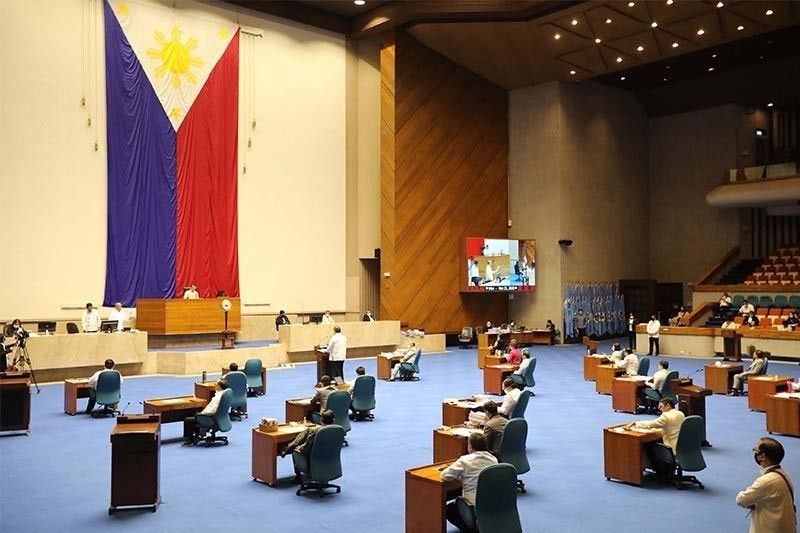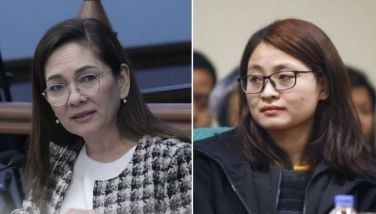Congress submits anti-terror bill to Duterte

MANILA, Philippines — The new anti-terrorism bill is now ready for President Duterte’s signature, as Congress yesterday transmitted to Malacañang copies of the controversial measure that various groups and sectors are opposing.
Presidential spokesman Harry Roque Jr. said at a press briefing yesterday that Duterte has 30 days from transmission of a measure to sign or veto it in its entirety or in parts.
Under the Constitution, the enrolled measure will lapse into law if not acted upon by the President within the 30-day period.
Certified as urgent by the President before Congress adjourned last week, the measure, once enacted, will effectively repeal the Human Security Act of 2007.
It will allow a longer period of up to 24 days to detain suspected terrorists without the filing of charges.
The measure also allows a longer period of up to six months, with court approval, for the conduct of surveillance operations, wiretapping and recording of private communications, access of data base, examination of bank records, freezing of assets of persons and organizations suspected of financing terrorism or having connections with alleged terrorists, among others.
Department of Justice (DOJ) Secretary Menardo Guevarra said the implementing rules and regulations (IRR) for the measure would have safeguards against abuse.
“Should the ATB (anti-terror bill) be enacted into law, the DOJ will endeavor to define more clearly, in the IRR that the ATC (anti-terror council) and the DOJ will be tasked to promulgate, the parameters within which the law will be implemented and enforced, in order to erase any latitude for misapplication or abuse,” Guevarra said.
He said the DOJ has set its own deadline of 15 days, beginning yesterday, to finish its comments on the bill.
“Assuming that the OP has received the enrolled Anti-Terror Bill today, we expect to immediately receive a letter requesting the DOJ to submit its comments on the bill. As in the past, we shall focus on issues of constitutionality.”
“Our deadline will be set by the OP, but I believe that 15 days will be good enough,” he said.
Opposition
Various academic institutions have urged President Duterte to veto the measure.
The University of the Philippines (UP) Diliman executive committee said the measure contains legal provisions that contravene the democratic spirit of the Constitution.
Jesuits and Lasallian brothers, who operate Ateneo and La Salle schools across the country, have also issued a joint statement calling on Duterte to listen to the public outcry against the bill. The University of Santo Tomas said the questionable provisions in the bill would gradually debilitate the exercise of civil liberties, with harmful results.
It called on the government to draw its efforts to the fight against the coronavirus disease, saying the proposed legislation has sown fear and divisiveness at a time when the country should be working together to address the pandemic.
In its statement, the UP Diliman executive committee – composed of the chancellor, vice chancellor and deans of different academic units – said the proposed measure would not eliminate terrorism by its root causes.
Rather, it said the provisions would embolden law enforcement agencies to disregard constitutionally protected human rights.
“It also violates the principle of separation of powers. Its expansive definition of ‘terrorism’ practically covers all forms of dissent, including lawful protests and criticism,” it said.
“The act unduly chills free expression as the expansive definition of crimes may cover legitimate forms of dissent,” it added.
UP Diliman said the proposal reduces the safeguards embedded in the Human Security Act, such as the removal of the provision that imposes a penalty on law enforcers on the wrongful detention of a suspect.
“Fully documented cases of police excess lead us to the conclusion that the law will not be applied judiciously but rather will give further space for a police force that is very much in need of professionalization and re-orientation,” read the statement.
“The supposed safeguards of the bill are not satisfactory and acceptable because they can be availed of only after the damage has been done to persons against whom the law has been applied. These even make it more prone to abuse,” it added.
SC help sought
A group of pro-bono lawyers may turn to the Supreme Court for help to stop the implementation of the anti-terror bill.
Chel Diokno, chairman of the Free Legal Assistance Group (FLAG), said filing a petition before the high court is one of the options they are considering if the controversial measure is enacted.
“That option is always there, maybe it would be better that this should be studied by the Supreme Court so we know if this is legal or violates the Constitution,” Diokno said in an interview with radio dzBB.
“It’s true that terrorism is a plague not just in our country but in the whole world. But we already have a law, the Human Security Act,” he said.
“It’s not the severity of punishment, if you want to stop crime, it is the certainty of punishment,” he added.
“Before it is only the judge who can order an arrest, now that power is given to the anti-terror council,” he said. “It is easy to use this law against the political opposition.”
The Catholic Bishops’ Conference of the Philippines-Committee on Basic Ecclesial Community (CBCP-BEC) has also expressed opposition to the anti-terror law.
“We continue to hope that our government officials will listen to the growing voices of the poor and marginalized and the concerned citizens – their constituents and true bosses – who gave them the privilege and power to craft and enact laws based on right reason and good intention for the benefit of all and not just the selected few,” the CBCP-BEC said.
Albay Rep. Edcel Lagman and Agusan del Norte Rep. Lawrence Fortun both called on the House leadership to defer certifying House Bill No. 6875 and transmitting it to the Palace for signature of President Duterte amid mounting public outrage and withdrawal of support from fellow lawmakers.
“Even the declaration of presidential spokesman Harry Roque that a prior thorough review of the constitutional issues concerning the bill will be conducted by the Office of the President before the controversial measure is submitted for presidential action also justifies the holding in abeyance the transmittal of the enrolled bill,” Lagman said.
“The issue is dividing the country in the middle of a pandemic and we have to revisit the bill to address mounting protest. It’s important also to listen to sentiments of all members of the House,” Fortun told The Chiefs on One News last Monday night.
Fortun believed that there is a strong chance for the House to recall its final approval of HB 6875.
“The objections are significant. It’s very seldom that you get 29 abstentions because normally you only have five at the most. This is an indication that many have reservations,” he pointed out.
Sen. Risa Hontiveros maintained that the compensation of P500,000 a day to any individual for wrongful arrest and accusation was actually a protection from abuses.
“The P500,000 was really a proper deterrent, if we want many convictions, let us improve intelligence gathering and case build-up of various law enforcement agencies,” she added.
Senate President Vicente Sotto III said it was too late for those blocking the transmittal.
“They (opposing congressmen) should not want to do that. A bill passed by both Houses of Congress was already enrolled and yet some congressmen would like to hold it? It has never been done. They would not want me to do that to any of their bills, do they?” Sotto told reporters. Cecille Suerte-Felipe, Paolo Romero, Edu Punay, Robertzon Ramirez, Evelyn Macairan, Helen Flores, Janvic Mateo,
- Latest
- Trending































